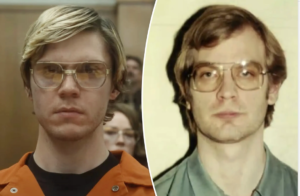
Why is it that when we find someone physically attractive it makes us more inclined to trust them? This phenomenon is apparent in every aspect of life but particularly when a character is pictured on our television screens, portrayed by an attractive actor, it is often easier to root for them. In recent years there have been various movies and television shows featuring serial killers, both true crime and works of fiction, most of which fit this description. Some of those which gained the most media attention include “Monster: The Jeffrey Dahmer Story” featuring Evan Peters, “Extremely Wicked, Shockingly Evil and Vile” featuring Zac Efron, and the fictitious work “You” featuring Penn Badgley. Each of these works not only cover the lives of a serial killer, but also center around characters who are so charming and good-looking that you almost want to root for them.
Despite gaining rapid popularity, each of these films and tv series have faced backlash as social media flooded with messages of support for these characters. In fact, many took to social media stating they wish they could be kidnapped, stalked, etc if it meant making contact with these individuals. While these messages were meant to be interpreted as a joke, many people felt as if these statements as well as the works themselves were extremely disrespectful to the victims and their loved ones. While these films and series were initially meant to be educational or entertaining, the portrayal of the childhood circumstances and personal life of these killers made many viewers develop a level of understanding whilst seemingly forgetting the horrific things they did to their victims.
This reaction to simply seeing an attractive man on a screen and the inclination to trust and root for that character despite what they have done parallels a real world issue. In many cases these killers did in fact use their attractiveness to lure young men and women to their deaths and the fact that this is being mirrored by reactions to their films displays just how much an attractive white man can get away with. It is of the utmost importance that the allure of serial killer media does not serve to gloss over the fact that these films and series cover events that have happened and do happen to real people and reactions should be censored to account for that.







I have a lot of thoughts about this concept, especially as someone who studies psychology. I think fantasizing and idolizing these characters, even if they are strictly bound to the actors who play these roles, is a form of projection and overall longing for something to obsess and fantasize about. This is not specific to serial killer documentaries, and can be seen across every anime, movie series, TV show fanbase, because there is always one character or one person with specific traits that is just attractive enough to lure in the right kind of audience and attention that people can easily fixate on.
This romanticization of serial killers raises concerns about the likelihood of people giving their trust to strangers on the basis of attractiveness. While many people are simply joking when they post comments about their desire to be kidnapped by attractive serial killers, it is important to address that some serial killers, like Jeffrey Dahmer, took advantage of victims with this mentality. Furthermore, I think that the way people have glorified portrayals of serial killers in popular media is disrespectful to victims’ families. When creating or watching shows like the ones mentioned in this article, it is important to recognize that the show depicts real-life victims who lost their lives in horrendous ways and to act respectfully towards them and their families.
I think that the romanticization of serial killers in these shows and movies is the work of the “halo effect”. The halo effect is when people tend to rate others who are physically attractive as having more positive traits, such as intelligence, honesty, confidence, and empathy. Attractive people are often seen as more trustworthy as well, which also could be how serial killers lured and manipulated their victims in real life. In some of these shows, such as Netflix’s recent Jeffrey Dahmer show, Evan Peters does resemble Jeffrey Dahmer, which could be seen as important for the story to be as accurate as possible. This does pose the question though, do these shows inherently romanticize serial killers, or are they just historically accurate? Is the way people consume and interpret the show the network’s responsibility?
These shows not only romanticize the serial killer, but being kidnapped. I think shows like these shouldn’t be made especially when the families of these victims didn’t want these shows in the first place. There are already enough documentaries and podcasts about these serial killers where people can get actual information about them. Shows like these are only made to romanticize and bring in money from it.
Ironically, the way some serial killers characteristics are being portrayed and „romanticized“ in movies/media is ultimately very similar to the scheme a serial killer manipulated his victims. However, I believe that movies/documentaries should only be made to serve educational purposes. I, too, believe that any kind of disrespectful comments on media- jokes, admiration, or negative comments towards the victims- should be „silenced“. Sure, ultimately even a killer is just a human, but falsely placed support is inappropriate and could potentially encourage imitators.
I think romanticizing serial killers is not uncommon, which reflects a more serious social and educational problem. On the one hand, it is totally understandable that people will prefer beautiful things, demonstrated by the halo effect mentioned in the other comments, and people tend to judge or trust others based on their appearance. On the other hand, the trend toward beautiful or good-looking people is partly socially constructed. Recruiting popular actors for serial killers or evil characters itself is not a problem at all. However, if the audiences ignore all the tragedies in real life and only fantasize about the things that they want to believe, it will become problematic. In short, serial killings are unforgiven and people need to pay attention to the seriousness of death.
This article touches upon such an interesting topic. I’ve definitely seen this pattern in the media where white men are romanticized for crime.
This is a great article topic that caught my attention. It was something I truly did not catch on with white men who tend to be attractive that take violence without a form of consequence until they get caught. I did notice a lot of attractive actors were put on set to be the main character of a crime story which catches a lot of attention from the audience. However, I definitely am surprised people think to say insensitive things when these “stories” are real life events that happened to real people. I love learning about crime but I wish some of the audience took this seriously in terms of learning how to prevent this happening to themselves or even to others by learning from serial killers and their actions.
Great article topic, about why society tends to trust attractive men. I would like to take that one step further and say that according to history, society tends to trust white average looking men. Bundy was definitely considered attractive to people, but Dahmer was a weirdo and the YOU character is not a real person but none the less they got away with far too much violence without even being suspected. Is it the Halo effect? Or is it just that modern society still tends to lean on the side of patriarchal white supremacy, hence why these men don’t get wrong caught sooner.
In regard to these television and films glorifying the killers, I believe that the victims of these dangerous, disgusting men need to be the ones glorified, and the tragedy of their lives being taken too early and too brutally need to be the prime focus. Rest in peace.
Hello Jordan!
The issue you bring up is very interesting to me as a psychology student. The idea that attractive people are seen as more trustworthy in society is not a new phenomenon, in fact this heuristic is called the halo effect in psychology. This has also been referred to as the “what is beautiful is good” principle, and it truly affects real people in everyday life. Essentially, the halo effect is when a positive attribute about a person (e.g. attractiveness) causes implications of other positive qualities (e.g. intelligence, empathy). In most circumstances, this is harmless, but for other circumstances involving criminality, this can cause severe obstruction to justice. Take a jury, for example, who is called on to make a decision about the guilt of an accused murderer. If said criminal is attractive, then they have statistically higher probability of getting a lower sentence, as opposed to a less attractive criminal. When it comes to TV shows that discuss upsetting themes of serial killers, this can be beneficial to raise attention to a horrific crime of the past, but attractive actors can also cause viewers to sympathize with horrendous criminals who caused suffering to real people. Crime depicted by Hollywood with “hot” actors, should not be equated to accurate depictions of real occurrences.